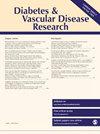Glucolipotoxicity induces endothelial cell dysfunction by activating autophagy and inhibiting autophagic flow
IF 3
4区 医学
Q3 ENDOCRINOLOGY & METABOLISM
引用次数: 2
Abstract
Objectives This study aims to determine the role and mechanism of autophagy in endothelial cell dysfunction by glucolipotoxicity. Methods Human umbilical vein endothelial cells (HUVECs) were treated with high glucose and high palmitic acid. The number of autophagosomes was evaluated by monodansylcadaverine (MDC) staining and transmission electron microscopy (TEM). The expression of autophagy-related proteins (LC3 and P62) was assessed by Western blotting. Capillary tube-like formation was evaluated on Matrigel. Reactive oxygen species (ROS) production was detected by DCFH-DA. Cell apoptosis was measured by Hoechst 33258 staining and flow cytometry. Phosphorylation of AMPK, mTOR, and ULK1 was also analyzed by Western blotting. Results We found that glucolipotoxicity induced autophagy initiation and hindered autophagosomes degradation. Moreover, glucolipotoxicity increased the production of intracellular ROS, decreased the ability of tubular formation, and increased cell apoptosis. However, endothelial cell dysfunction was alleviated by 3-methyladenine, an early-stage autophagy inhibitor. Additionally, glucolipotoxicity promoted the phosphorylation of AMPK and ULK1 and inhibited the phosphorylation of mTOR. Conclusions Glucolipotoxicity initiates autophagy through the AMPK/mTOR/ULK1 signaling pathway and inhibits autophagic flow, leading to the accumulation of autophagosomes, thereby inducing apoptosis and impairing endothelial cell function.糖脂毒性通过激活自噬和抑制自噬流诱导内皮细胞功能障碍
目的本研究旨在确定自噬在糖脂毒性引起的内皮细胞功能障碍中的作用和机制。方法用高糖和高棕榈酸处理人脐静脉内皮细胞(HUVECs)。通过单丹酰尸胺(MDC)染色和透射电子显微镜(TEM)评估自噬体的数量。通过蛋白质印迹法评估自噬相关蛋白(LC3和P62)的表达。在Matrigel上评估毛细管状形成。通过DCFH-DA检测活性氧(ROS)的产生。通过Hoechst 33258染色和流式细胞术测量细胞凋亡。AMPK、mTOR和ULK1的磷酸化也通过蛋白质印迹进行分析。结果我们发现糖脂毒性诱导了自噬的启动,并阻碍了自噬体的降解。此外,糖脂毒性增加了细胞内ROS的产生,降低了小管形成的能力,并增加了细胞凋亡。然而,早期自噬抑制剂3-甲基腺嘌呤减轻了内皮细胞功能障碍。此外,糖脂毒性促进AMPK和ULK1的磷酸化,并抑制mTOR的磷酸化。结论糖脂毒性通过AMPK/mTOR/ULK1信号通路启动自噬,抑制自噬流,导致自噬体积聚,从而诱导细胞凋亡,损害内皮细胞功能。
本文章由计算机程序翻译,如有差异,请以英文原文为准。
求助全文
约1分钟内获得全文
求助全文
来源期刊

Diabetes & Vascular Disease Research
ENDOCRINOLOGY & METABOLISM-PERIPHERAL VASCULAR DISEASE
CiteScore
4.40
自引率
0.00%
发文量
33
审稿时长
>12 weeks
期刊介绍:
Diabetes & Vascular Disease Research is the first international peer-reviewed journal to unite diabetes and vascular disease in a single title. The journal publishes original papers, research letters and reviews. This journal is a member of the Committee on Publication Ethics (COPE)
 求助内容:
求助内容: 应助结果提醒方式:
应助结果提醒方式:


